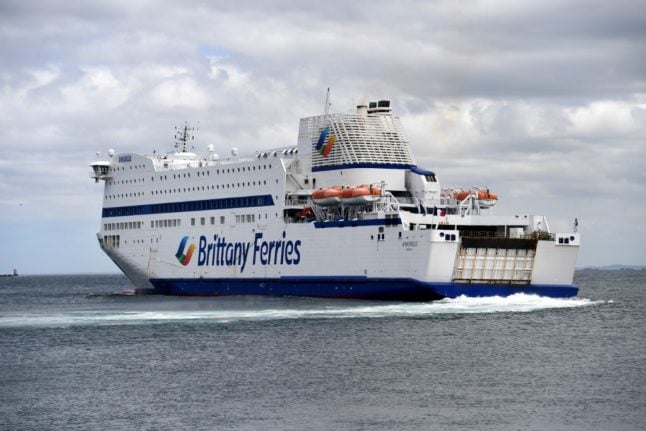Britons who are resident in France before December 31st 2020 benefit from the provisions of the Withdrawal Agreement which gives broad-ranging guarantees that they can stay and work or retire here.
Those Britons who move in 2021 however, cannot take advantage of freedom of movement and will face new rules of entry to France. That means confronting the world of visas which includes financial requirements that not everyone can satisfy.
READ ALSO What are the differences between moving to France before and after December 31st?
When France closed its border to all arrivals from the UK over fears of the new Covid-19 strain, the plans of those people who had anticipated a last-minute move before the end of the Brexit transition period collapsed.
With ongoing uncertainty over entry to France for non-residents, it's now not clear whether they will be here in time for the December 31st deadline.
Two people caught in this anxious limbo are Catriona Taylor, 61, and her husband Martin Ellingham, 67, from Essex, who had planned to pick up the keys of their new French home next week.
The couple have bought a rural property in the Creuse département of central France and had an appointment with the notaire to complete the final paperwork and pick up the keys on December 30th.
Catriona said: “We were planning to travel on December 28th, we wanted one last Christmas in the UK before moving to France, but now we just don't know whether we will be able to travel or not.
“We have been getting PCR tests sorted in case that is a requirement for travel and I've been phoning and emailing everyone that I can think of, it's just a complete rollercoaster of up and down.
“I feel so angry that all this has been caused by the ineptitude of the British government – a situation that should have just been a domestic rule-change has now become this huge international situation.”
IT consultant Catriona, whose father was a French teacher, has long harboured a wish to move to France every since summers spent here as a teenager, but it was only after a three-week holiday over the summer that the couple decided to take the plunge.
She said: “I had always thought about moving to France and with everything that is happening to the UK with Brexit and everything I wasn't sure I wanted to live there any more and I certainly didn't want my taxes going to the current government.
“We were here for three weeks over the summer and it was lovely – my husband discovered that he can get the Test Match cricket (on the radio) so then he agreed!”
They initially signed for their house in September, but legal wrangles around adjoining land meant that they have not been able to finally complete the sale until December, just in time for the Brexit deadline.
Catriona said: “We just want to get there and get to our house, start doing it up and contributing to the local community in our new village.
“But now everything is uncertain.
“Martin had a small business that did a lot of sales to the EU which is now not viable, so we had already suffered from Brexit.”
The British Embassy in France said it had been contacted by others in Catriona's position.
“We understand the anxiety the current situation may be causing, and will continue to seek clarity from the French Government about how your rights will be respected,” the embassy said on Facebook.
The embassy added: “Under the Withdrawal Agreement, you need to be living in France by 31 December 2020, but you don't need to own your property or have a long-term rental contract. However, you want to be able to show you are settled here, or at least have the intention of settling here and have (ideally) started the necessary motions e.g. by applying for a bank account etc.
“The French authorities plan to take a flexible approach and have suggested that temporary accommodation in itself should not be a block to granting residency, as long as you can clearly demonstrate that you arrived no later than 31 December 2020 with the intention of settling.”
Has your last minute move to France before Brexit been thrown into doubt by the travel ban? Please let us know. Email [email protected]



 Please whitelist us to continue reading.
Please whitelist us to continue reading.
Sadly, eleventh hour anything is always a risk in 2020, doubly so when the UK is involved. The rules for moving during the transition have been clear for months. UKers will still be able to get residency, it just may prove to be a bit trickier. Third country nationals have been doing it for decades.
Thankfully, while French bureaucracy can be ‘thorough’, it’s efficient. Not quick necessarily, but efficient.
Wishing Catriona & Martin the very best of luck that the situation will ease enough in the next few days.
A lot of unnecessary panic was generated, because people felt they had to be physically present in France on or by the 31st Dec (11pm GMT). They don’t. Presence on a specific day or days is not a criteria for the residency application. Of course, people normally need to come to France at least once to see where they want to live and make accommodation arrangements, but a lot can be done at distance. It is conceivable, that a person does not in fact need to even go to France at all to obtain the necessary docs to show residency – e.g. if paying an agent or relocation company (with power of attorney as needed) to do the leg-work on paper-work. FOr those already with a second home, converting to permanent residence, I see no obligation to travel to France to do the necessary ‘demarche’. Clearly the eventual ‘convocation’ to the prefecture needs to be honoured in-person, but that will come (much) later.